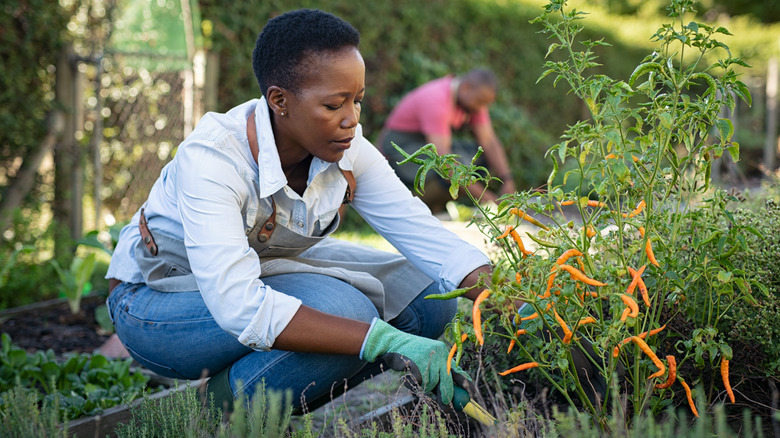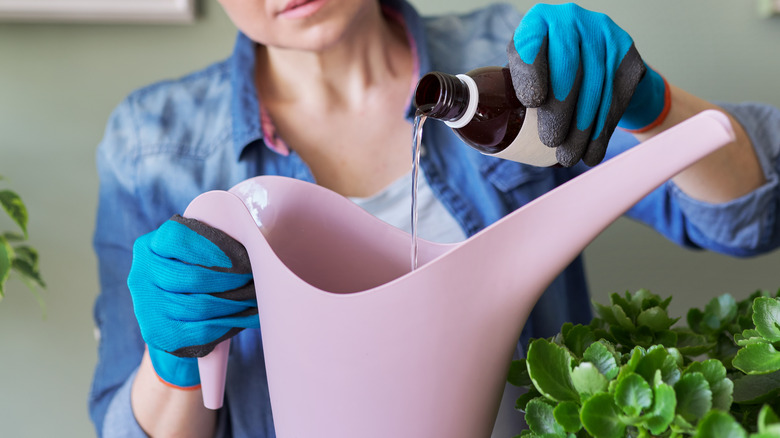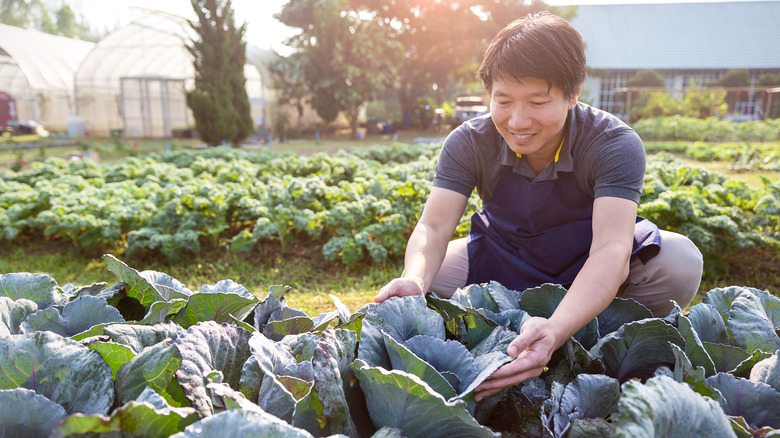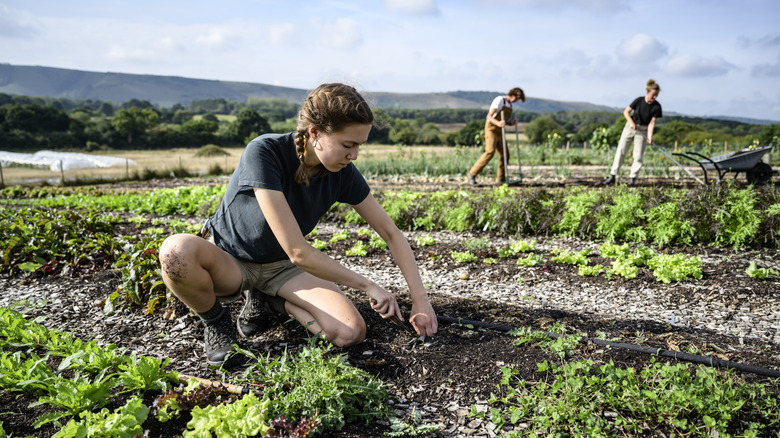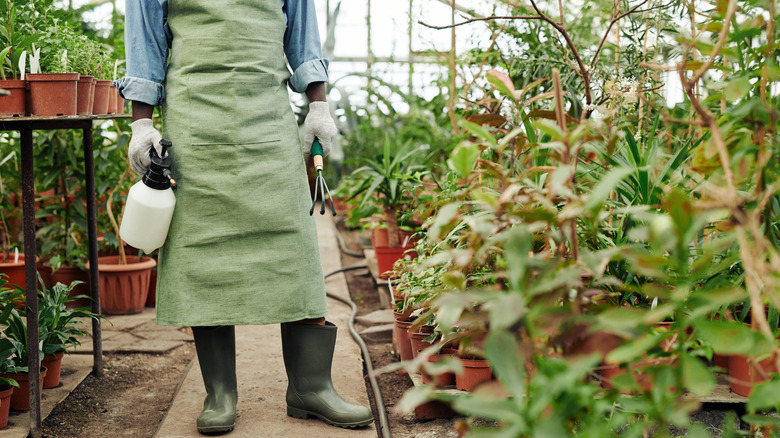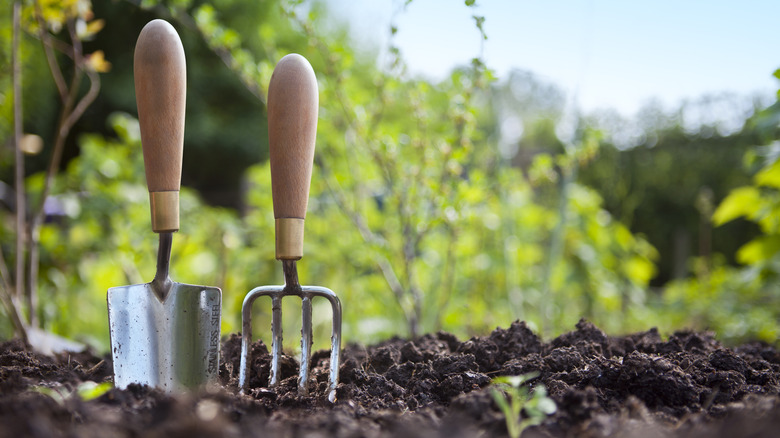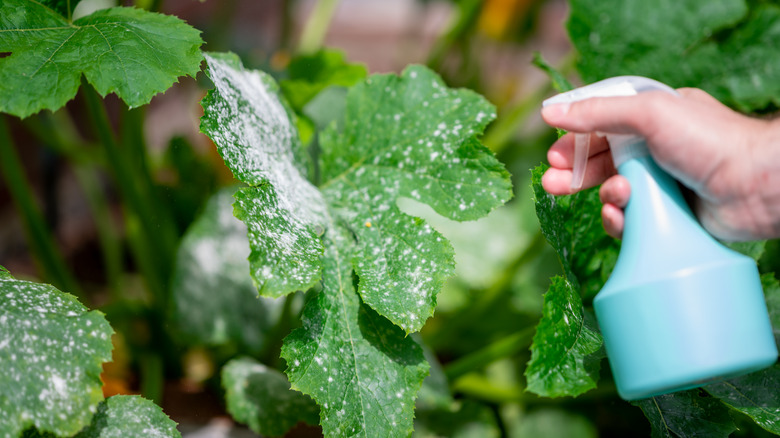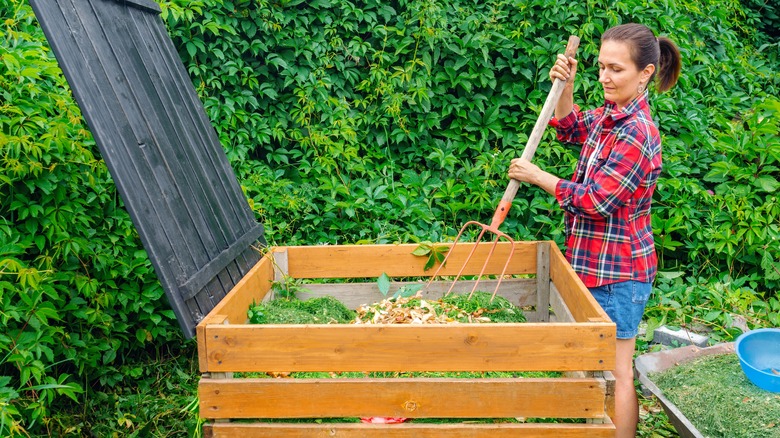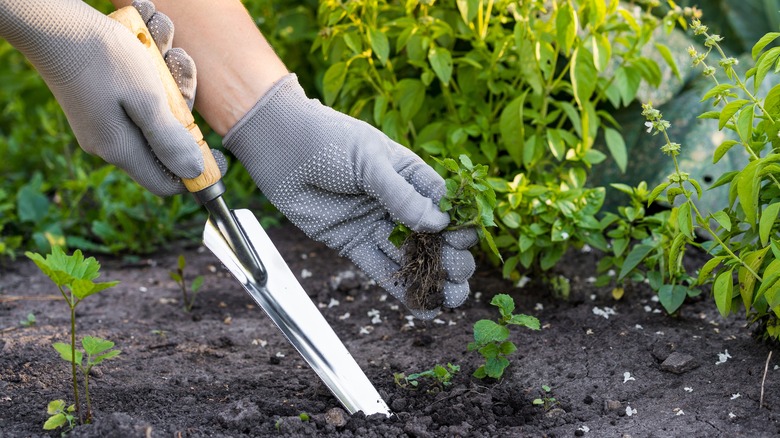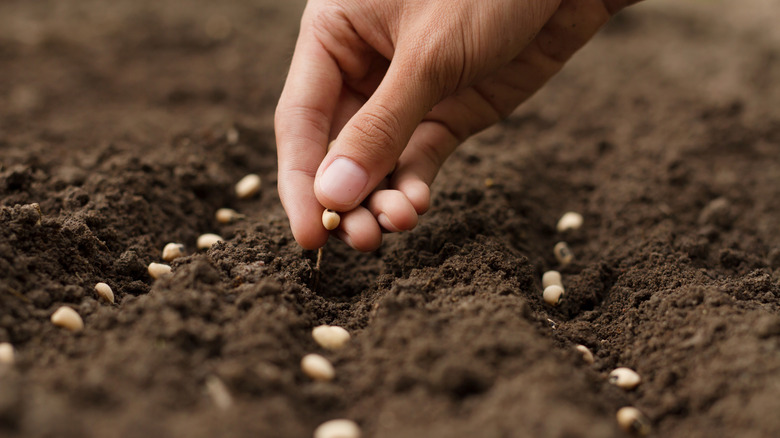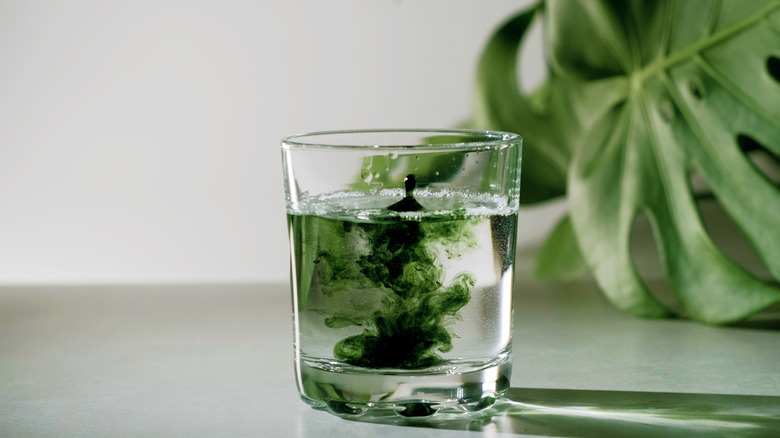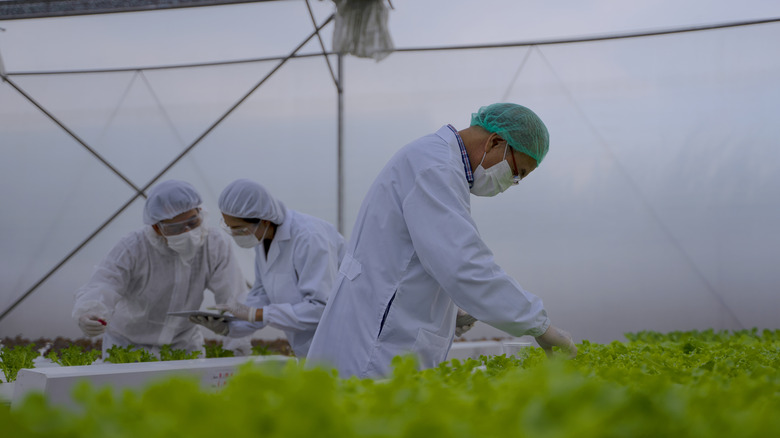All The Brilliant Ways Hydrogen Peroxide Can Be Used In Your Garden
You might be surprised to learn that hydrogen peroxide is actually a fantastic tool for your plants and soil! This common household item, made up of two hydrogen and two oxygen atoms, is surprisingly versatile. You may know it as a gentle antiseptic for wounds, but in the garden, it's a whole different story. Here's the exciting part: Hydrogen peroxide can be your secret weapon for a range of gardening tasks. From acting as a gentle pesticide to being a powerful fertilizer, it covers a lot of ground. Ever faced those pesky bugs munching on your plants? Or maybe you've got soil that's more like a stubborn, compacted block than a fluffy, plant-friendly bed. Hydrogen peroxide can come to your rescue. It can even give your plants a growth boost, helping them absorb nutrients more effectively.
Now, if you're thinking about the environment (and let's face it, as gardeners, we all do), hydrogen peroxide is a thumbs-up choice. When it breaks down, it turns into water and oxygen — nothing harmful or toxic. That means it's not just good for your plants, but it's also kind to Mother Earth. So, if you're intrigued but unsure how to start using hydrogen peroxide in your garden, don't worry. It's actually quite simple, and the benefits are impressive.
Use it as a fertilizer to improve plant growth and nutrient uptake
You can add a diluted solution of hydrogen peroxide to fertilize your plants. The ideal ratio is about 15 ml of hydrogen peroxide mixed with one liter of water. This concoction, when used weekly, can lead to visibly healthier and more robust growth. When hydrogen peroxide breaks down into water, it forms an extra oxygen atom, which plays a crucial role in enhancing root health and nutrient absorption. Numerous scientific studies further support the effects of hydrogen peroxide on plant growth. One 2020 study published in the journal Agronomy found that hydrogen peroxide can ramp up the antioxidant activity in plants. Antioxidants are super important for a plant's health and ability to bounce back from tough conditions. The same study also highlighted how hydrogen peroxide treatment increases the levels of total phenol and flavonoids in plants. It's like giving plants a natural shield, making them tougher against all sorts of environmental challenges.
A 2017 study, published in the journal Acta Biochimica Polonica, dives into the nitty-gritty of how hydrogen peroxide works at a cellular level. It has a way of interacting with certain proteins in plants, setting off a chain reaction that activates various pathways inside the plant, which then kickstart transcription factors. These factors are like the control center for gene expression and the cell cycle. In layman's terms, hydrogen peroxide is like a signal flare for plants, telling them to gear up and grow better, even when they're under stress.
Use it to control pests on crops
If insects are munching up all your treasured plants, hydrogen peroxide offers a straightforward and effective solution. To use it, mix four parts water with one part 3% hydrogen peroxide and spray on your plants. This technique is particularly adept at combating the larvae of fungus gnats, notorious for thriving in moist soil conditions. Fungus gnats, especially during their larval stage, are a significant threat to plant health. They favor damp environments to lay their eggs. When these eggs hatch, the larvae primarily feed on organic material present in the soil, such as fungi and decomposing plant debris. The real problem arises when they start feeding on the roots, notably targeting the fragile roots of seedlings and young plants. This root damage manifests as stunted plant growth and yellowing of leaves, and can even lead to the plant's death in extreme cases.
According to the United States Environmental Protection Agency, the inclusion of hydrogen peroxide in many agricultural pesticide products supports its use in controlling these pests. These products generally contain no more than 35% hydrogen peroxide concentration, which is then further diluted to 1% or less for safe and effective application. This diluted hydrogen peroxide solution acts as a powerful pesticide, offering an eco-friendly alternative to traditional chemical pesticides.
Use it for soil aeration in clay and compacted soils
If you're grappling with clay or compacted soil, hydrogen peroxide offers a promising solution. To improve such soil, mix a solution of hydrogen peroxide with water in a ratio of 1:3. Then, apply this mixture to the problematic soil areas. Compacted soil is a common issue, especially in high-traffic areas of the garden or where heavy machinery is used. It's characterized by densely packed soil particles, which significantly reduce the soil's ability to absorb air and water. This lack of aeration in the soil can severely limit root growth and nutrient uptake, leading to stunted plant development. So, why does hydrogen peroxide work in such scenarios? The answer lies in the extra oxygen, which is released when hydrogen peroxide comes into the mix. It can significantly improve clayey or compacted soils, which are often oxygen-deficient. This effect was highlighted in a 2016 study published in the journal Rhizosphere, emphasizing the challenges posed by poorly drained, clayey soils due to their oxygen deficiency.
Further supporting this, a 2009 study in the Chilean Journal of Agricultural Research demonstrated that when you put hydrogen peroxide into the soil, the above-ground parts of plants — like leaves and stems — tend to grow more. This happens because hydrogen peroxide makes the soil better, helping the roots of the plants grow stronger and take up nutrients more efficiently. Essentially, adding hydrogen peroxide is like giving the plants a growth boost by improving the environment they're growing in.
Use it to disinfect your greenhouse
Keeping your greenhouse clean is crucial. You see, greenhouses are great for growing plants, but they can also be hotspots for plant pathogens like fungi and bacteria. These unwanted guests can spread diseases quickly. Regular cleaning with the right disinfectants, like our hydrogen peroxide mix, can help keep these pathogens in check. It's like giving your plants a safe neighborhood to grow in. Algae is another issue in greenhouses. It's not just unsightly; it's a perfect home for pests like fungus gnats. Hydrogen peroxide serves as an effective, eco-friendly disinfectant. Here's a simple way to make a great all-purpose cleaning spray: Take 16 ounces of hydrogen peroxide and mix it with a teaspoon of your favorite essential oil.
So why is hydrogen peroxide good for cleaning? Well, it creates tiny, powerful particles that can break down important parts of cells, like the outer shell (membrane), the genetic material (DNA), and other crucial bits inside. This action makes it really good at getting rid of harmful microorganisms. Adding essential oils is like the cherry on top. Many of these oils have natural antibacterial and antifungal properties. So, not only does your greenhouse stay clean, but it also smells great.
Use it to clean your garden tools
Every time you cut, trim, or dig, your tools come into contact with soil, sap, plant material, and even pests. They can easily become carriers for disease, fungi, and bacteria, which can then be transferred from one plant to another as you move around your garden. Think of it like washing your hands: Just as you wouldn't want to spread germs with dirty hands, you don't want to spread plant diseases with dirty tools. While we've already explored using hydrogen peroxide for greenhouse cleaning, it's also a fantastic tool for keeping your garden tools in top shape. Create an all-purpose cleaning spray by mixing 16 ounces of hydrogen peroxide with a teaspoon of essential oil.
As mentioned earlier, hydrogen peroxide works well as a disinfectant. On the FDA's website, you can even find a list of approved liquid chemical sterilants and high-level disinfectants that include hydrogen peroxide, along with their specified conditions for safe and effective use.
Use it as an anti-fungal plant and soil treatment
Let's shift our focus to combating fungi in the garden. Fungal plant diseases come in various forms and can cause a range of problems in the garden. From the powdery mildew that leaves a white coating on leaves to the dreaded root rot that attacks a plant's foundation, fungi can be a gardener's nightmare. These diseases not only mar the appearance of plants but also hinder their growth and, in severe cases, lead to plant death. Hydrogen peroxide once again emerges as a potent ally. For conditions like powdery mildew, a general rule of thumb is to mix a gallon of water with a tablespoon of hydrogen peroxide. For root rot, you'll need equal amounts of 3% hydrogen peroxide and water. Apply only to the soil and not to plant leaves to prevent burning.
Hydrogen peroxide's role in managing these diseases is noteworthy. The United States Environmental Protection Agency (EPA) has officially recognized the effectiveness of hydrogen peroxide. It's now approved for use in controlling small pests, like bacteria and fungi, on various crops. This endorsement covers both indoor houseplants and outdoor agricultural crops, highlighting its wide range of applicability in plant care. This is further evidence of the substance's ability to prevent and control bacteria and fungi that cause serious plant diseases.
Use it as a compost accelerator
In the world of gardening, composting is a key process for turning kitchen scraps and garden waste into nutrient-rich soil. It's a natural process of breaking down organic matter into a substance that can greatly benefit plant growth. However, sometimes compost piles can be slow to break down for one reason or another. This is where hydrogen peroxide comes in. It can play a pivotal role in making your composting efforts even more effective.
A 2001 study in the journal Acta Horticulturae highlights this very aspect. In this study, laboratory-scale experiments showed that adding hydrogen peroxide to compost triggered a faster rise in temperature within the composting mass and reached higher levels compared to control trials. So, what does this mean for your compost pile? By incorporating hydrogen peroxide, you can expect a faster, more efficient breakdown of organic material. This results in the quicker production of high-quality compost, which is essential for enriching the soil in your garden. Unfortunately, the study didn't state the exact amount of hydrogen peroxide that was used. Furthermore, there isn't much information on how to apply hydrogen peroxide to compost. To be on the safe side, it might be best to experiment and do a test run.
Use it as a weed killer
Weeds compete with your plants for sunlight, water, and nutrients, often aggressively so. They can also harbor pests and diseases, creating more problems for your garden. In the never-ending battle against weeds in your garden, hydrogen peroxide emerges as a formidable weapon. A 2021 study published in the Naresuan University Journals provides some insightful data. The research found that a mixture of 10% hydrogen peroxide and 0.2% dish soap was successful in getting rid of most of the weeds. Interestingly, when this concentration was mixed with 0.2% soapberry extract, it was particularly effective against sleepy grass, though not as much against other grassy weeds.
This finding is backed up by an earlier 2019 study in the Madras Agricultural Journal. Here, scientists observed a lower presence of weeds after applying hydrogen peroxide to various weed crops. This suggests that hydrogen peroxide doesn't just remove weeds temporarily; it helps reduce their overall growth. These studies highlight that hydrogen peroxide can be a powerful tool in your gardening arsenal when getting rid of weeds, especially when combined with other substances like dish soap or soapberry extract.
Use it for seed germination
Let's dive into how hydrogen peroxide can be a game-changer in the early stages of a plant's life, specifically during seed germination. Seed germination happens when seeds awaken from dormancy and start to sprout. It's a critical phase in a plant's life cycle, requiring the right conditions of moisture, temperature, and sometimes, a little extra help to kickstart the process. Hydrogen peroxide comes into play as a valuable ally in germination. Its role? To give seeds a boost, they need to break out of their shell and start growing. Usually, a 1-3% hydrogen peroxide solution is ideal. Depending on the seed type and the peroxide strength, soaking times can range from as short as five minutes to as long as 48 hours. It's crucial to strike a balance, ensuring enough time for the hydrogen peroxide to act but not so long that it damages the seeds.
So why does this work? Hydrogen peroxide softens the seed's hard outer coating, making it easier for the sprout to emerge. Additionally, it supplies extra oxygen, which is vital for the growing seedlings, encouraging robust and healthy growth. This indicates that hydrogen peroxide isn't just beneficial; it's potentially transformative in the germination process. A 2023 study published in the journal ACS Omega sheds more light on this. Researchers conducted several tests using different levels of hydrogen peroxide on seeds. The results were clear: Seeds treated with hydrogen peroxide showed significant growth in their seedling stage compared to those that weren't.
Use it to increase chlorophyll content
Chlorophyll plays a starring role in a plant's life, acting as the crucial component in photosynthesis, the process by which plants convert sunlight into energy. It's what gives plants their lush green color and is fundamental for their growth and health. So, boosting chlorophyll in plants is akin to ensuring they have a healthy diet full of all the nutrients they need to grow strong and healthy. Here's where hydrogen peroxide can make a significant impact — it's also a catalyst for increasing chlorophyll content in plants. The previously mentioned 2023 study published in the journal ACS Omega took a deep dive into this. The researchers experimented with different concentrations of hydrogen peroxide on plants and found a noticeable increase in chlorophyll content. This means that with the right amount of hydrogen peroxide, plants can become greener, healthier, and more vigorous.
If you're thinking about using hydrogen peroxide in this way, a key consideration is the concentration. The study explored various levels, so it's wise to start with a small, diluted amount and observe how your plants respond. A patch test on a few leaves or a small area can be a good starting point. You're looking for a positive response without any signs of stress or damage to the plant.
Use it for hydroponics
Hydroponics, the art of growing plants without soil, is a fascinating and efficient way to cultivate plants. In a hydroponic garden, plants are grown in a water-based solution rich in nutrients. This method allows for precise control over the nutrients and water that plants receive. However, the key to hydroponics is ensuring that the water remains oxygen-rich and free from harmful pathogens. That's where hydrogen peroxide comes into the picture. The process is quite simple. Just mix roughly 3.7 liters (about a gallon) of water with about 2 to 3 teaspoons of hydrogen peroxide. Then, use this mixture in your hydroponic system. The hydrogen peroxide works by adding extra oxygen to the water, which the roots of the plants absorb eagerly.
Scientific research has supported the advantages of using hydrogen peroxide in hydroponics. A 2021 study published in the journal Horticulturae highlighted that hydrogen peroxide could make organic hydroponic fertilization more effective. This finding is significant because it opens up new possibilities for organic farming methods in hydroponic systems, which traditionally rely heavily on inorganic nutrient solutions. The addition of hydrogen peroxide to your hydroponic setup does more than just oxygenate the water. It also helps keep the water clean by killing off harmful microbes and pathogens. This ensures that your plants are growing in a healthy environment, which is especially crucial in a closed system like hydroponics, where diseases can spread quickly.
